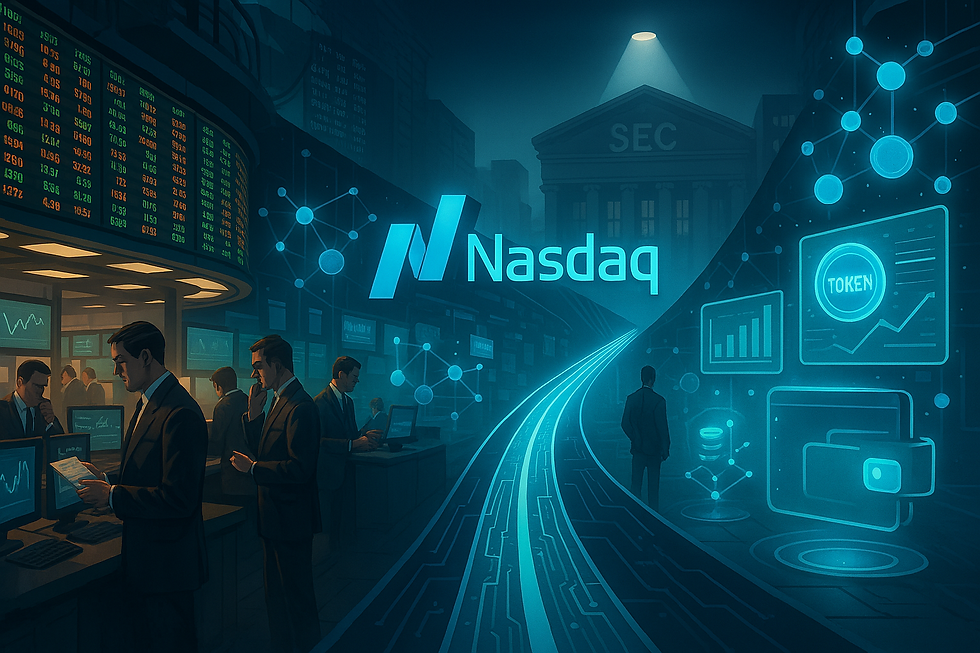NASDAQ bets on blockchain with tokenised stocks and ETFs
- Contributors
- Sep 19, 2025
- 3 min read

Nasdaq, one of the largest US stock exchanges, is seeking approval from the Securities and Exchange Commission (SEC) to offer tokenised versions of stocks and exchange traded funds (ETFs). If approved, this would be the first time tokenised securities are permitted on a major US exchange - a move that could reshape market infrastructure by integrating blockchain technology into the existing financial system and enabling 24/5 trading (not quite 24/7 just yet).
What is tokenisation?
Tokenisation means creating a digital version of an asset on a blockchain. In this case, it would represent financial securities such as stocks or bonds. Tokenised securities promise benefits such as faster settlement, lower transaction costs, better audit trails and a smoother process from order to settlement. No clear definition of what exactly tokenisation is has yet reached an industry standard, with various approaches being tested.
The exchange has filed a proposal with the SEC to allow tokenised securities to trade on its markets. CEO Adena Friedman also announced the plan on the All-In Podcast, saying it will modernise the system by reducing friction and enabling 24/5 trading - something the industry previously resisted. Nasdaq's goal is to capture the efficiency gains of blockchain while preserving investor protections and market safeguards.
How it works
Nasdaq's proposal will use existing US market infrastructure to allow securities to trade in two forms:
Traditional form: A digital record of ownership without blockchain.
Tokenised form: A digital record of ownership using blockchain or distributed ledger technology.
When placing an order, participants can choose regular or tokenised settlement. The Depository Trust Corporation (DTC), an entity which presently handles all clearing and settlement on NASDAQ, will handle clearing and settlement for both forms of trading. The trading will take place under the SEC's existing federal regulations.
When a stock trade is executed and subsequently tokenised by DTC, the process will remain unchanged from the participant’s perspective. Market operations, execution quality and the user experience on trading platforms are proposed to continue to function as they do under the current framework.
Chuck Mack, Senior Vice President of North American Markets at Nasdaq, added that tokenised and traditional shares will share the same identification number, rights and value:
From our perspective, it’s important to emphasize that while tokenized securities are technologically distinct from those traded today on Nasdaq’s market, under our proposal they still represent the same store of value as their traditional counterparts.
While tokenisation offers various benefits, Nasdaq is taking an investor-first approach to "fully realize the benefits of innovation":
The challenge – and the responsibility – is to ensure that this transformation is grounded in investor-first principles. [ ... ] The strongest markets, and the ones that endure, are those built on trust. If we can balance innovation with investor protection, we can build markets that are not just more efficient – but fundamentally better.
What's next?
The SEC will publish Nasdaq's filing for public comment, while Nasdaq will work with clients and stakeholders to receive feedback and refine the proposal. This move aligns with a broader policy shift under President Donald Trump's pro-crypto administration and ongoing efforts in Congress to draft legislation for tokenised assets.
Globally, despite the lack of a clear definition, tokenisation is gaining momentum, and coordination will be key to "reduce friction and align incentives ... in the evolution of the global financial markets". Recently the Cayman Islands announced consultation on laws to permit tokenised funds.
Written by Steven Pettigrove and Emma Assaf with Michael Bacina



